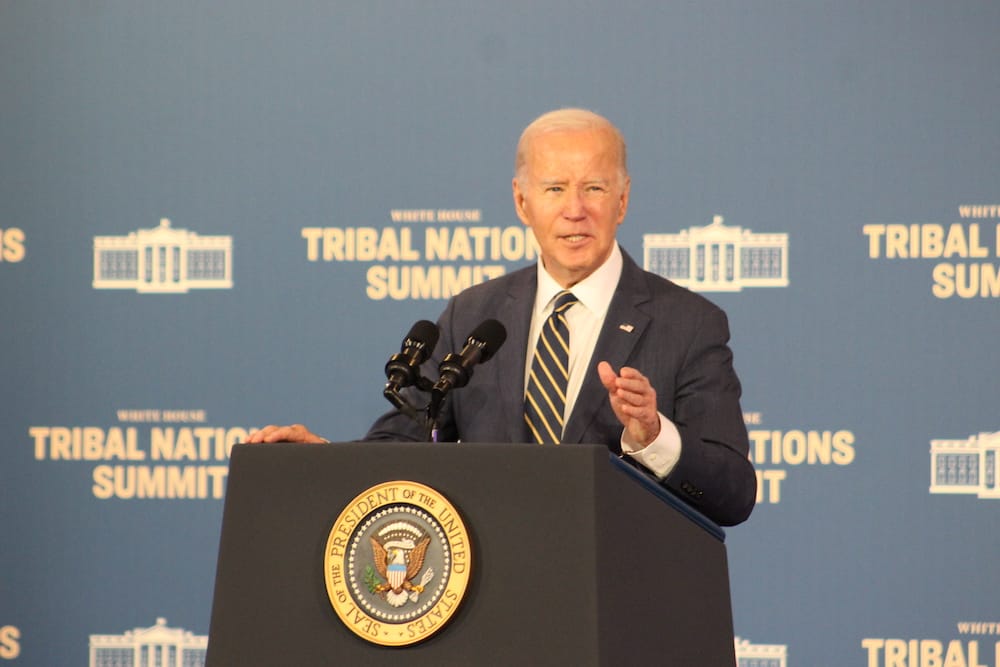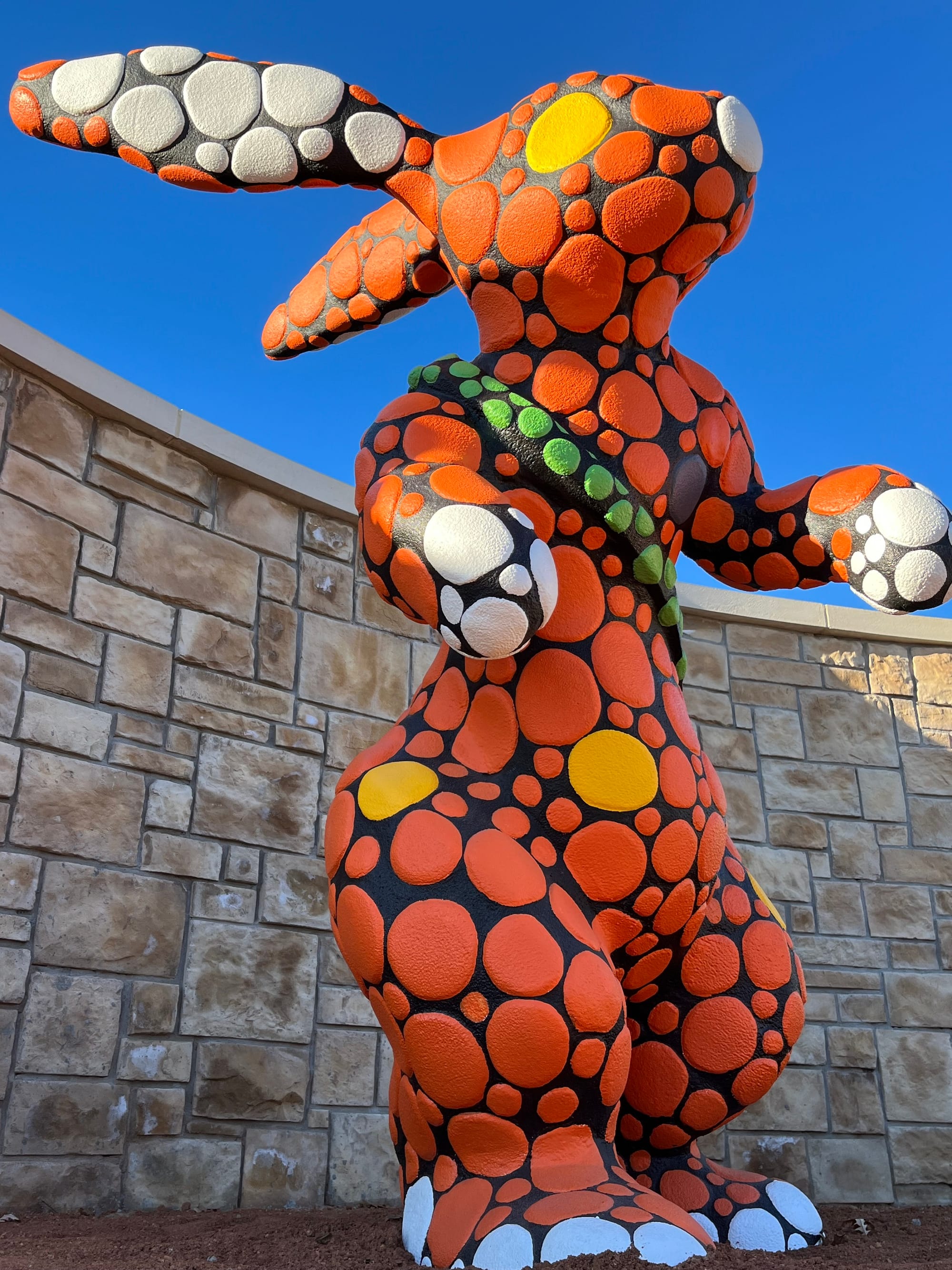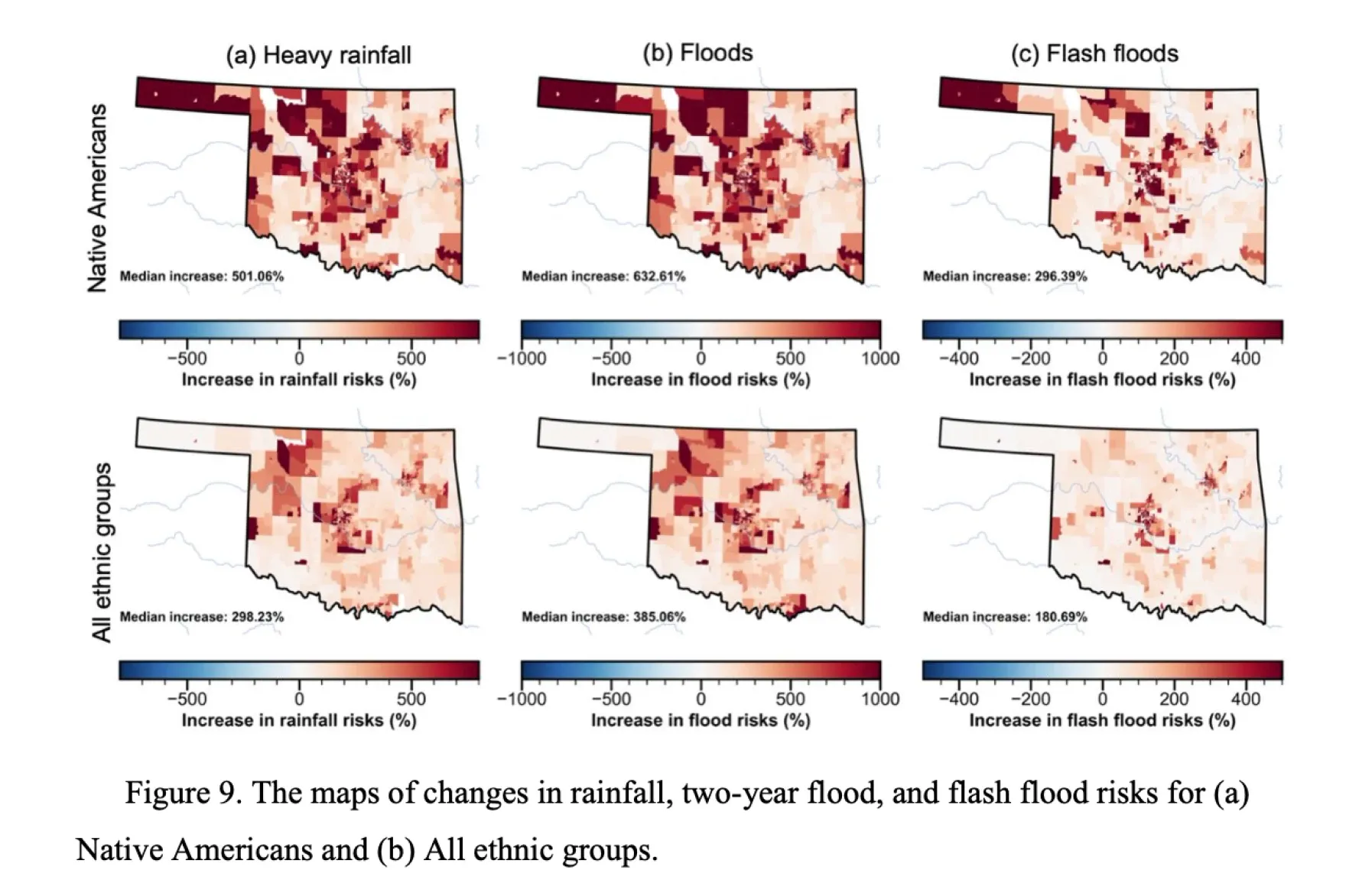

White House Tribal Nations Summit highlights sweeping initiatives for tribal empowerment, economic development

President Joe Biden hosted the third annual White House Tribal Nations Summit this week, emphasizing his administration's commitment to strengthening nation-to-nation relationships with tribes.
The gathering brought together tribal leaders and top administration officials to address critical issues facing tribal communities. On Wednesday, Dec. 6, Biden signed an executive order on reforming federal funding and support for tribal nations and aimed at promoting the next era of tribal self-determination and ensuring the federal government embraces its trust responsibilities.
The summit also showcased a range of federal programs and initiatives meant to address crucial issues faced by tribal nations. These included co-stewardship agreements for managing federal lands, training federal employees on tribal treaty rights, protecting sacred sites, streamlining critical federal processes, increasing accessibility of federal resources, and prioritizing the health, education, safety, and welfare of Native communities.
As part of the summit, several key initiatives impacting tribal economic development in Indian Country were announced including efforts to reform federal rules and processes for fee-to-trust land acquisitions and Indian homeownership.
The Department of the Interior (DOI) announced the publication of its final rule amending the process that governs the fee-to-trust lands process for tribal nations to transfer land title to the United States to hold in trust for the benefit of an individual Native citizen or a tribe, including in Alaska. The final rule creates a more efficient, less cumbersome, and less expensive fee-to-trust process, according to a White House briefing.
The Department of Housing and Urban Development (HUD) also announced plans to publish a final rule in 2024 to strengthen the Section 184 Indian Home Loan Guarantee Program, a program that has become synonymous with homeownership in Indian Country.
The Section 184 program has been controversial because only a small percentage of its lending has taken place on trust land, per prior Tribal Business News reporting. The vast majority of its loans have been for off-reservation property, though HUD maintains that a considerable amount of this lending is in border areas near reservations.
HUD’s proposed new rule aims to modernize the program and provide more homeownership opportunities in Indian Country by codifying program requirements, introducing greater certainty into the program to attract more lenders, and authorizing HUD to establish a minimum level of lending on trust land.
The summit also featured new programs and reporting on Biden administration efforts to increase access to federal resources for tribal nations.
On Wednesday, the DOI and White House Council on Native American Affairs (WHCNAA) announced it would launch a new website called the Access to Capital Clearinghouse. The site provides a searchable database of federal funding opportunities, including grants and loans that are available to tribal nations and Native businesses through federal agencies.
The DOI and WHCNAA also unveiled a draft Request for Information (RFI) that will, when finalized, help the federal government identify and estimate funding that tribal nations require to meet their communities’ needs. The RFI will allow tribes to identify barriers they face in accessing federal resources. The WHCNAA said it will take the draft directly to tribal consultation in January 2024.
The DOI and the Department of Health and Human Services (HHS), which oversees the Indian Health Service (IHS) also announced their progress on awarding contracts to Native-owned or Native-controlled businesses under the final rules of the Buy Indian Act.
The IHS announced it awarded $444 million to Native businesses, representing 30.6% of its total spending on contracts. HHS purchased a total of $1.5 billion from Native enterprises.
The DOI said it awarded more than $1.4 billion in contracts to Indian economic enterprises in fiscal 2023, up from $1.2 billion in fiscal 2022. The totals include a record high of $1.03 billion awarded to Indian small business economic enterprises in fiscal 2023, an increase of more than 8% over the prior fiscal year.
Last year, the DOI’s Bureau of Indian Affairs introduced new rules to make the Buy Indian Act work better. They launched the Buy Indian Act Information and Tools website, making it easier for staff and the public to get training, engage with stakeholders, and find info about Native American-owned businesses. The goal is to make it simple for people to identify and support Native American vendors when looking for contract opportunities under the Buy Indian initiative.
Assistant Secretary for Indian Affairs Bryan Newland emphasized that these actions show the Interior Department's dedication to Indian Country and align with the Biden administration's focus on helping small and disadvantaged businesses. He sees it as a crucial part of their mission to revitalize American Indian and Alaska Native Tribal communities by increasing economic opportunities.
Several other federal agencies announced economic development programs during the Tribal Nations Summit, including the Treasury, which announced an $86 million funding round for tribes under the State Small Business Credit Initiative, and the USDA, which unveiled the initial awardees under a $50 million grant program to help increase food sovereignty for tribes.

Skydance Brewing Co. to partner with Kickapoo Casino.
Partnership to bring new taproom to Kickapoo Casino in Harrah, OK

Oklahoma City, OK - Skydance Brewing Co. announced a new partnership with Kickapoo Casino. This partnership will allow the Kickapoo Tribe of Oklahoma to open a new Skydance taproom inside its casino located in Harrah, OK.
The new taproom will feature a large menu of Skydance’s handcrafted beers, including their core lineup and a large number of limited releases. Work has also begun on an exclusive co-branded Kickapoo beer to be served in the taproom and in cans at the Kickapoo Tribes adjacent C-Store.
“From the day we opened Skydance Brewing Co., we’ve always seen our brand as a Native owned craft brewery to be a perfect fit to partner with tribal casinos and bring craft beer to gaming properties,” says Jake Keyes, Founder & CEO at Skydance Brewing Co. “Our goal is to recreate what we did in our Oklahoma City taproom and bring it to Kickapoo Casino and the Harrah, OK community.”
“Forming partnerships between tribes and native owned companies is important. It allows commerce and economic development in Indian Country to prosper.” says Keyes. “Partnering with tribes is very personal for us and means the world to our team. While this is a great opportunity for Skydance, we feel this partnership is a great way for us to help Kickapoo Casino to bring a new customer base into its gaming facility and for both of us to do some cross-promotion of our companies.”
“Kickapoo Casinos will continuously pursue changes and actions to further enrich the experience of our patrons – and this partnership does just that. As leaders, we are focused on new opportunities to connect with consumers in new occasions,” says Darwin Kaskaske, Chairman of the Kickapoo Tribe of Oklahoma. “As craft brewing continues to gain popularity throughout the nation, the opportunity to partner with a Native-Owned brewery in Skydance was a perfect fit. It creates awareness that Native Americans are a vital part of this country’s heritage, and still are to this day. Our core values align with what the Skydance brand stand for, and we are looking forward to incredible things we will do in the years ahead.”
Details of this partnership include:
• New taproom inside Kickapoo Casino featuring full lineup of Skydance beers
• Creation of a new Kickapoo branded beer (details to be announced)
• Employee Development Program: Skydance to allow Kickapoo employees to train in the OKC location
• Expected to open in early 2024
About Skydance Brewing Co.:
Skydance Brewing Co. is Oklahoma’s Native American craft brewery. Founded in 2018, Skydance began brewing beer in a co-op brewery, The Brewers Union, before opening a location of their own in Automobile Alley at 1 NE 7th St. in Oklahoma City, OK. Skydance has a 2,000 sq ft taproom with a large patio at its current location. With a 15 bbl brewhouse and packaging line, Skydance produces beer that is distributed to retail locations all over Oklahoma. Since opening, Skydance has garnered recognition from multiple publications, including being named as one of the 12 Best New Breweries of 2021 by Hop Culture Magazine and its founder, Jake Keyes, was named to 405 Business Magazines list of the Metro’s Most Influential. Skydance is particularly known for brewing great IPA’s and for collaborating with Native American artists to create beautiful artwork for their cans. Founder, Jake Keyes, was also recently elected to his first term as Chairman of the Iowa Tribe of Oklahoma. Keyes and his fiancé, Skydance Director of Operations, Bobbi Gabler, both have several years of experience in the tribal casino industry.
About Kickapoo Casino:
Kickapoo Casino Harrah is home to over 600 E-games, a variety of table games, Eaglerock Lounge, and Redfork Restaurant. Kickapoo Casino Shawnee opened in November of 2012, offering an upbeat environment featuring over 300 e-games and Legacy Bar & Grill. These little gems have the best customer service and rewards customers appreciate. The Kickapoo Trading Co. offers unique Native American designs by Native owned companies as well as items created by Kickapoo Tribe of Oklahoma Tribal Members. Opened in September of 2022, the new store is located inside the Kickapoo Travel Plaza at 25200 East Highway 62 in Harrah. The Kickapoo Tribe of Oklahoma and Kickapoo Casinos are continuously allocating resources on renovations and remodels. The Taproom partnership with Skydance Brewing Co. will bring in a product line to the community that no other casino is offering, and an experience that you cannot get anywhere else.
New outdoor art installations debut in Cherokee Cultural Pathway

TAHLEQUAH, Okla. – New public art is on display at the Cherokee Cultural Pathway in historic downtown Tahlequah. The pathway serves as an immersive walkway connecting the Nation’s downtown museum properties and showcases artwork by Cherokee Nation artists.
The new installations are the first of nine permanent works slated for the pathway. The first three pieces include work from Cherokee National Treasure Eddie Morrison and Cherokee Nation artists Tama Roberts and Bryan Waytula.
Morrison’s work features four limestone sculptures of female figures whom he has known throughout his life. One statue depicts Cherokee pottery makers, while the others represent basket makers, wild onion gatherers and all the matriarchs who have played important roles in Cherokee culture since ancient times. Each sculpture stands nearly 4 feet tall, 1 foot wide and is constructed entirely from fossilized limestone fence posts.
The largest of the new installations, “Protection,” was constructed by Roberts. The nearly 11-foot tall, 500-pound sculpture was crafted almost entirely of stainless steel and represents the artist’s interpretation of the forked eye referenced in Cherokee culture, which identified beings of the upper world that allow protection and vision above and below. The insets on each forked eye offer prayers of protection.
Known for his prisma color drawings, charcoal works and small painted figures, Waytula brings his “Trickster Rabbit” to life in a large-scale rendition, topping out at over 6 feet tall. The sculpture is built with a reinforced skeleton, sculpted with foam, sprayed with a protective polyurea, primed and painted with colors to represent the Cherokee Nation flag.
Additional installations will be added in the new year.
As part of its rotating exhibitions, the pathway is currently hosting “Roy Boney Jr.: Notes from the Storyteller’s Sketchbook.” The exhibition runs through next spring and showcases 14 large-scale reproductions of Boney’s award-winning work, ranging from humorous takes on popular movies to studied interpretations of Cherokee history and culture. Boney’s words accompany each piece to share the inspiration and processes behind the art.
For more information on Cherokee Nation’s Museum properties and exhibits, visit www.VisitCherokeeNation.com.
Climate scientists need collaboration with tribal communities for solutions, OU study shows

The study, published by the American Meteorological Society, says tribal nations like the Otoe-Missouria are nearly 70% more susceptible to flooding than the general population in Oklahoma.
OU’s School of Meteorology and the Department of Native American Studies collaborated on the research, using regional climate models and flash flood models to help make climate-related risk assessments and recommendations for Native lands.
Zhi Li is the study's lead author and a recent meteorology school graduate. Li was invited to visit the Otoe-Missouria Tribe 26 miles north of Stillwater after historic floods hit the community in 2019, leaving culturally significant sites like encampment grounds, as well as cars and homes underwater.
He said the motivation for this research is to bridge the gap between scientists and tribal communities.
“We need to learn from how they deal with climate and how to deal with nature so that we can co-develop some nature-based solutions, rather than engineering ways to deal with nature,” Li said.
Li said scientists can’t do this work alone. He hopes this study will help scientists better support communities on the frontlines of climate change, instead of just extracting knowledge from them.
Farina King is a co-author of the study and the Horizon Endowed Chair of Native American Ecology and Culture at OU, and she echoes Li’s hopes.
King said this research is the first step in connecting top climate scientists with tribal communities and building collaborative relationships.
“It is essential that we take this time to build those relationships, trust, [and] learn the specific protocols of those Indigenous communities,” she said.
She said to come up with climate solutions, like it is important to understand Native American perspectives.
According to Otoe-Missouria Tribe Emergency Manager James LeClair, the tribe has been working with OU since 2019 to assess and evaluate past, present, and future flood damage to their tribal lands.
Since then, the tribe has found several solutions that could mitigate flood damage including retention ponds and reinforcing the banks of Red Rock Creek.
The Otoe-Missouria tribe is currently seeking grant funding for these projects.



